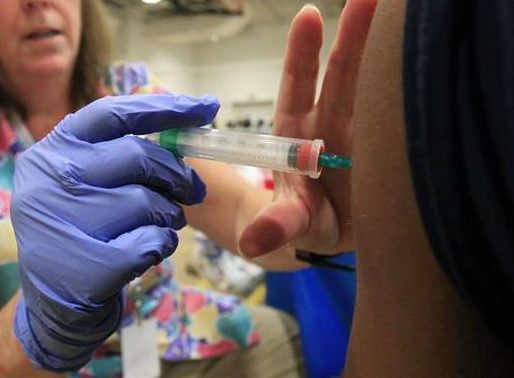TORONTO – Sometimes kids will come into the doctor’s office frequently with bleeding, seizures, fevers or medication poisoning.

There is a rare form of abuse Canadian doctors are warning about: it’s called caregiver-fabricated illness and it’s been flying under the radar, according to a McMaster University study published Monday in the journal Pediatrics.
The study is warning doctors to take note of any signs of child abuse that may be going on in a household.
“Pediatricians and other health care providers working with children and families need to be alert to inconsistencies between the medical history as reported by a parent and a child’s signs and symptoms, and to situations where children are at risk for receiving harmful care,” lead author Dr. Harriet MacMillan told Global News.
Read more: Irregular bedtimes in young kids may sap brain power, study suggests
She told the Canadian Press that in the child, it’s maltreatment while in the caregiver, it’s considered a psychiatric disorder.
“One example would be where a parent is reporting that the child has certain symptoms that the child doesn’t have,” she told the wire service.
“The parent will say, ‘My child has terrible abdominal pain.’ So it begins with a set of X-rays, then other (diagnostic) procedures or potentially even exploratory surgery.”
Dr. Marc Feldman, a psychiatrist at the University of Alabama and an internationally-recognized expert in Munchausen’s and other forms of medical deception, told the Canadian Press that parents behind this kind of abuse are typically seeking emotional gratification, but at the cost of the child’s well-being.
“And usually that comes in the form of seeking attention and sympathy,” he said from Tuscaloosa, Ala. “So they present themselves as the caregivers of terribly ill children, whose illnesses are defying diagnosis. And predictably, they get a lot of care and concern from immediate family as well as the community.”

Get weekly health news
Feldman, author of “Playing Sick,” said many of these parents are dissatisfied with how their own lives have turned out and feel out of control. Successfully manipulating the beliefs of “high-status professionals like doctors allows them to feel once again in control.”
One of the most common means of “proving” their assertions to health providers is to cause their child to stop breathing.
“I actually have videotapes of several perpetrators, male and female, suffocating the child when they think they’re not being observed,” he said.
“In one case, the father literally positions his entire body over the infant’s head with the infant’s face pressed into the mattress and he stays in that position for 70 seconds, and then gets up when a nurse enters the room and the child is unconscious but alive.”
Read more: Healthy doctors make healthy patients, Canadian study finds
MacMillan estimates that about six to nine per cent of kids die from this abuse and another six to nine per cent end up with long-term disability or permanent injury.
But it’s often under-recognized and underreported so it’s hard to document the full extent of the problem.
This is why doctors need to be educated about the condition.
“It is difficult for practitioners working with children and families to accept that parents may falsify a child’s history. It can be hard to comprehend that a parent might deliberately harm a child,” MacMillan said.
Read more: Preschoolers’ eating habits linked to future heart health risks, Canadian study suggests
The most obvious hint is if children return to hospital with recurrent illness – they’re injured, or bleeding, or they’re fighting infection. Kids should also be interviewed individually when they’re being assessed.
Caregiver-fabricated illness has been known since the 1980s. At that time, it was called Munchausen syndrome by proxy, taken from Baron von Munchausen, an 18th-century German aristocrat who allegedly told fake stories about his life.
In the 1900s, those who made up symptoms that led to self-harm had “Munchausen’s syndrome.”
Now, the latest rewrite of the Diagnostic and Statistical Manual, or the guide the medical community refers to, calls the condition “factitious disorder imposed on another.”
That new name is important, MacMillan says. It focuses on the child instead of the motivations of the caregiver.
Read more: Children’s cancer wing transforms into superhero ward offering ‘superformula’ chemotherapy
While babies and toddlers are often the victims, older children and even caregiver-dependent disabled adults can also be the subjects of sham symptoms, Feldman said.
carmen.chai@globalnews.ca
Follow @Carmen_Chai







Comments
Want to discuss? Please read our Commenting Policy first.